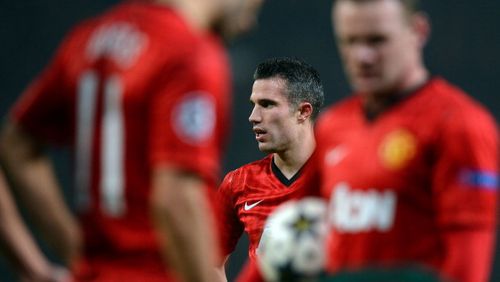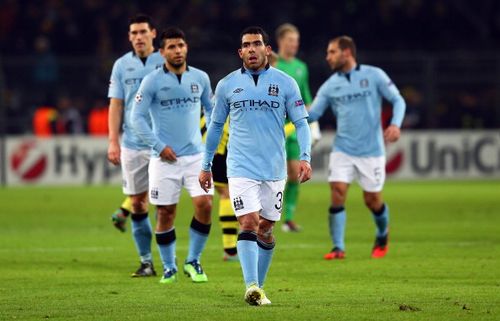
European football: Is the English Sun waning?
The fixtures for the quarter-finals of the Champions League are out; and to a lot of irregular followers of football, it’s quite a surprise that the regular contenders from England – Manchester United – are missing. In fact, it’s not just the Red Devils that are missing from those still in contention in Europe’s premier competition; it is every single club that qualified from the English Premier League. So why exactly is this happening, and what does this mean for English football?

Manchester United’s Dutch striker Robin van Persie reacts after the UEFA Champions League round of 16 second leg football match between Manchester United and Real Madrid at Old Trafford in Manchester, northwest England on March 5, 2013. Real Madrid won 2-1 (3-2 on aggregate).
Before we try to answer these questions, let us look at how exactly the English clubs have fared thus far in Europe this season. Manchester United, who are mentioned foremost thanks to their consistent runs deep into the tournament over the recent past, have fallen at the hands of Real Madrid in the first knock-out round. Compatriots Arsenal, in spite of earning a draw on aggregate, have fallen to Bayern Munich, who know the importance of their 3 – 1 win in London.
The other two, Manchester City and Chelsea, failed to even make it past the group stages. While the former failed to win even a single game, quite shamefully for they are the reigning champions of England, the latter have gone on to overcome two sides in the Europa League, and are hoping to add another piece of European silverware to their trophy cabinet.
So why exactly have English teams fared so badly in this season’s Champions League tournament? It could not possibly be because of a lack of money or stars, since the two which crashed out at the group stages are among the richest in the world and possess a formidable arsenal of players each. It could not possibly be entirely attributed to a lack of aura either, since, with the exception of Bayern Munich against Arsenal, almost all clubs have paid due respect to the English sides, both while playing home and away.
A part of the blame, perhaps, can be put down to inexperience. Manchester City, for their second straight season in the Champions League, have failed to adapt to the rigours and demands of European football, and have often paid too little respect to the attacking talent that oppositions possess. They have once too often made the mistake of assuming that they will be able to impose their style of play on the game, and have found to their peril that they cannot, leaving them stranded without a backup plan on the pitch. With Chelsea, and to a degree, Arsenal and Manchester United, it has mainly been the infusion of youth into the respective starting elevens that has paved the way to showcasing inexperience. There is no remedy for inexperience but time.

Manchester City are still having problems coping with European football
Another portion of the blame can perhaps be attributed to the style of play that the English have developed, which is often far too physical and deals with oppositions of a similar nature. Thus, when they come up against the likes of Ronaldo or Mandzukic, who are sufficiently clever to make the most of contact from an opposition player, English clubs are left with the dreaded choice between conceding a foul or backing off far too deep. This is also affected quite often by refereeing decisions from officials who are used to watching a far less physical game week in and week out and thus look at contact fouls more seriously than Premier League referees. Of course, questions over biased officiating may be raised, particularly over the red card to Nani which changed the face of United’s tie against Madrid, but there is little one can discuss about that in a concrete manner.
One final issue that we must look at is the lack of respect from English clubs for their oppositions. That is to say, English sides often seem to believe that an opposition which is as famous as, say, Reading, is only as good in quality as Reading. This is often not true, and clubs which are the champions or runners up from their respective leagues have more in the bag than one would expect from a bottom-half Premier League club. Chelsea found that out the hard way on their visit to the Donbass Arena, and while they did manage a win in the return fixture, it was the former result that would come back to really hurt them. Manchester United themselves, playing in a group of relatively unknown quantities, had to record come-from-behind wins in 3 of their 6 group fixtures, without which we might even have had a repeat of their group stage exit from last season. The sooner Premier League clubs learn to exercise sufficient caution in dealing with European opposition, the better their results are likely to become.
So does this really indicate that English clubs are tumbling down the pecking order of European football? One would think not. As already mentioned, Chelsea are still very much in contention for the Europa League, and lest we forget, so are Newcastle and Tottenham. Chelsea are also the current holders of the Champions League, and it will take at least another couple of years of group stage exits for one to discount them from Europe’s elite. Arsenal have been consistent in qualifying for the Champions League, although their last real surge in the tournament was a while back, whereas Manchester City can only improve on their performances this season and the past.
Manchester United have reason to grumble over their loss to Madrid; that notwithstanding, they have been England’s most consistent in Europe in recent seasons. The very fact that people are surprised to not see an English club in the quarter finals this year indicates the clout that the Premier League possesses, and one hopes that it is embodied in the tournament next season.